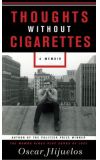
18 Jun 2011 03:02:57
Growing up in New York, Hijuelos' identity as a Cuban seems constantly stacked against him. With his blond hair and light skin, he is commonly confused as a German or American, even among fellow compatriots — what might seem like an insignificant shortcoming, but a sort of jab to his already fragile identity each time he is mistakenly addressed in English.
After an enchanting trip with his mother to Cuba as a young child, he becomes ill with a kidney disease and is hospitalized for a year, during which he loses, and never truly recovers, his Spanish. Once released, he is limited to a strict diet of bland food and forbidden from eating Cuban staples like crispy lechon or fried plantains that his family cherishes.
"For the longest time, all I would know was that I had gotten sick in Cuba, from Cuban microbios, that the illness had blossomed in the land of my forebears, the country where I had once been loved and whose language fell as music on my ears," Hijuelos writes. "Of course, diseases happen anywhere, and children get sick under any circumstances, but what I would hear for years afterward from my mother was that something Cuban had nearly killed me and, in the process of my healing, would turn my own `Cubaness' into air."
It's an experience of displacement and a never ending inability to reach an identity he inherits, but cannot truly grasp, that many Cubans of his generation, along with anyone who has felt divided between two homelands, will understand and relate to. It also defines much of his development as a writer, as he initially hesitates to embrace his story, and that of his family, as a source of inspiration for his fictional characters — too ashamed to put them on paper, believing the world was indifferent to his tale.
Indeed, Hijuelos himself acknowledges the unlikely course his life has taken and the near impossibility of becoming a writer. Raised in a tough Manhattan neighborhood in the 1960s, countless friends fell into a fatal spiral of drugs and alcohol abuse. He wasn't surrounded by books, often picking up comic strips instead, if he read at all.
Yet his life is rich with stories and characters that later populate his novels — his mother, a beautiful, creative woman who meets her future husband selling tickets at a movie theater in Cuba and later follows him to New York, where she is agonized by his late nights and heavy drinking; Hijuelos' father, a jubilant but tormented soul from the Cuban countryside who narrowly scrapes by a living for his family as a hotel cook and whose premature death from a heart attack, before his youngest son can truly know him, leaves a lasting mark; and, of course, the countless men and women from Hijuelos' neighborhood, whose tales of past triumphs and unrequited loves nearly risk being forgotten.
Enrolling in New York City community colleges, an array of spectacular early writing teachers — Susan Sontag, Donald Barthelme, Frederic Tuten — encourage him to continue pursuing his craft. He is also exposed to Cuban and Latin American writers like Jose Lezama Lima, Gabriel Garcia Marquez and Carlos Fuentes, whose work inspired him.

